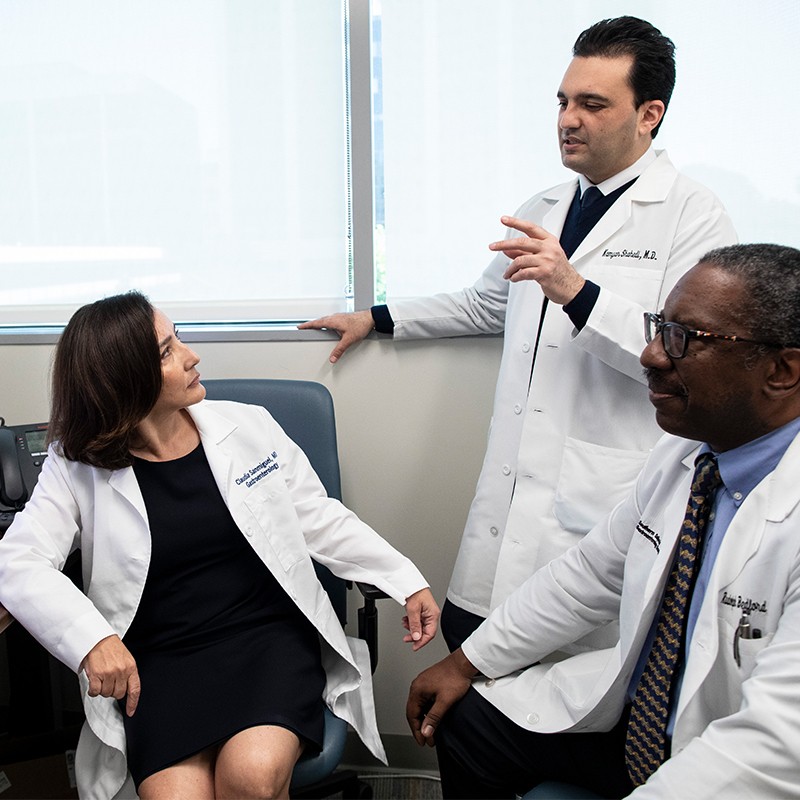Nausea and Vomiting

Overview
Nausea and Vomiting
Nausea and vomiting are usually symptoms of an underlying disorder, rather than a cause or stand alone diagnosis. Usually, vomiting is harmless, but could be a sign of a more serious illness and may be caused by numerous conditions and various factors which may include:
- Medication
- Indigestion
- Intense pain
- Motion sickness or seasickness
- Emotional stress such as fear
- Concussion
- Gallbladder disease
- Food poisoning
- Overeating
- Ulcers
- A reaction from certain smells
- Intestinal blocking
- Bulimia
- Heart attack
- Appendicitis
For children, vomiting is common when there is a viral infection, food poisoning, a milk allergy, motion sickness, overeating or feeding and illnesses in which the child has a high fever.
You should see your Saint John’s Physician Partners doctor if you have persistent nausea or vomiting since this may indicate a more serious condition.
Symptoms
Nausea and Vomiting Symptoms
Most nausea and vomiting symptoms clear up on their own or with over-the-counter medications. However, you should call your doctor about your nausea and vomiting if you have the following symptoms:
- The nausea last more than a few days or if you think you’re pregnant
- If your home treatment doesn’t work and you’re dehydrated
- If you’ve sustained an injury, such as a head injury or infection
- Adults taking care of sick children need to be aware of visible signs of dehydration, rapid breathing or pulse, decreased urination and a sunken fontanelle, the soft spot on top of the baby’s head.
You should seek immediate care for the following:
Complications
Nausea and Vomiting Potential Complications
Most nausea and vomiting will clear up on its own or with over-the-counter medications, unless you have an underlying chronic condition. Persistent vomiting can cause dehydration and malnutrition. You may also have your hair and nails become weak and brittle, and constant vomiting can decay your tooth enamel. That’s why it’s important to see your Saint John’s Physician Partners doctor to make sure your condition is properly diagnose and treated.

Diagnosis
Nausea and Vomiting Diagnosis
Diagnosis of nausea and vomiting is evident by your symptoms. However, your doctor will take a medical history and perform a physical exam. Your doctor may ask you about your eating habits and whether anything makes the nausea and vomiting better or worse.
Your doctor may order tests to rule out more serious conditions such as:
- Celiac disease
- Irritable bowel syndrome
- Crohn’s disease
Tests may include:
- Upper endoscopy
- Colonoscopy
Treatments
Nausea and Vomiting Treatments
Treatment may vary depending on underlying conditions and may include:
- Staying hydrated including oral rehydrating solution such as Pedialyte®
- Drinking small amounts of clear, sweetened liquids such as soda or fruit juices
- Avoiding strong odors or other triggers
- Using over-the-counter medications, such as Dramamine® for motion sickness
- Resting in a sitting position or in a propped lying position
- Eating bland foods
- If pregnant nibbling on crackers
- Avoiding alcohol
- Vomiting due to cancer treatments or other diagnosed conditions are often treated with medication
Your Saint John’s Physician Partners gastroenterologist will recommend and discuss your specific treatment options as well as risks and benefits so you can make an informed decision on the best treatment for you.
Specialists





